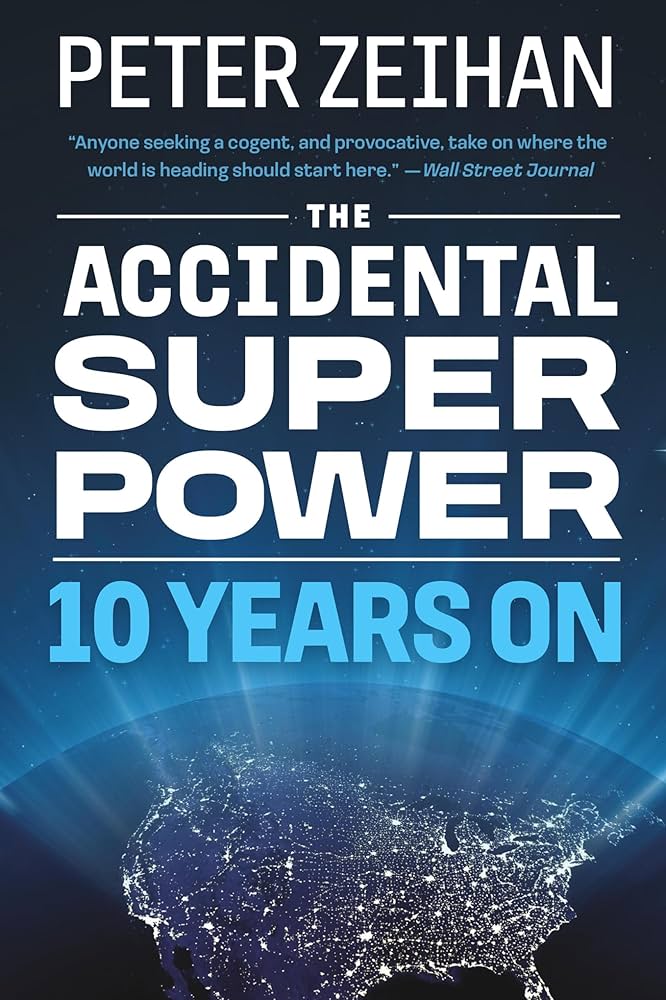By Malik Abu Luqman
The Accidental Superpower: 10 Years on
Peter Zeihan
2024
 In The Accidental Superpower: Ten Years On, Peter Zeihan provides an updated analysis of his first book on geopolitics. Where his last book focused on his prediction that the US Bretton Woods world order was ending, this one takes us back to the basics of geopolitics. He goes into some detail to explain the role that geography, demographics, and energy play in the ascent or collapse of nations. For example, he illustrates how Egypt’s unique geography, with its fertile soil, reliable water supply from the Nile, and natural barriers provided security and allowed for the development of a thriving civilization. The surplus labour generated by these favourable conditions could be utilised for expanding infrastructure, building armies, and advancing various fields of knowledge. The ease of internal transport within Egypt facilitated governance and early consolidation into a single kingdom. In contrast, the challenges of external transport inhibited foreign invasions for centuries.
In The Accidental Superpower: Ten Years On, Peter Zeihan provides an updated analysis of his first book on geopolitics. Where his last book focused on his prediction that the US Bretton Woods world order was ending, this one takes us back to the basics of geopolitics. He goes into some detail to explain the role that geography, demographics, and energy play in the ascent or collapse of nations. For example, he illustrates how Egypt’s unique geography, with its fertile soil, reliable water supply from the Nile, and natural barriers provided security and allowed for the development of a thriving civilization. The surplus labour generated by these favourable conditions could be utilised for expanding infrastructure, building armies, and advancing various fields of knowledge. The ease of internal transport within Egypt facilitated governance and early consolidation into a single kingdom. In contrast, the challenges of external transport inhibited foreign invasions for centuries.
Zeihan extends this approach to the United States, examining how its geopolitical benefits have made it a global superpower. Specifically, the United States boasts an extensive network of navigable waterways, including the Mississippi River and the Intracoastal Waterway (i.e. the stretch of coastline that runs along the Gulf of Mexico from Key West in Florida to Brownsville in Texas). These have significantly reduced transportation costs and have facilitated the efficient movement of goods across the country. Additionally, the US benefits from a temperate climate favourable for agriculture and human habitation. It is also protected by two oceans, minimising external threats. These factors have allowed the United States to develop a robust, consumer-driven economy with minimal dependence on international trade while also enjoying a secure environment that has fostered rapid industrialisation and growth.
Zeihan also addresses the United States’ energy policies. He has an unapologetic tone regarding America’s use of shale oil, noting its importance in sustaining the country’s superpower status. At the same time, he points to advancements in sustainable energy, revealing that, starting in 2022, the scale of new renewable energy installations has exceeded that of natural gas, which, until 2014, was comparable in its contribution to national electricity generation.
When it comes to the rest of the world, the author categorises the world into “partners” and “players,” albeit in an America-centric way. He classifies partners of the United States into various categories based on their strategic, economic, and geographic importance and the specific advantages they provide to America. In a nod to the Monroe Doctrine, he sees nations in the Western hemisphere primarily as partners, including Cuba and Venezuela. He also places Canada in the partner camp but is betting on the country’s dissolution. Regarding Europe, he sees Denmark and Holland as the crucial “intermediaries” for the US to use for trading with the old world. The UK is also a strategic partner, but more as a tool to help the US prevent a united Europe from happening. Other partners include Thailand, Myanmar, Taiwan, South Korea, Singapore, Australia, New Zealand, the Philippines, Malaysia, Indonesia, and Vietnam.
The players are the countries he sees outside America’s inner circle, including Russia, Turkey, Uzbekistan, Japan, Angola, South Africa, and Iran. Our review of Disunited Nations covered Zeihan’s views on Turkey. Concerning Iran, he suggests that they will go from “enemy to ally” as one power in the region that will act as a balancing power against Turkey and Saudi Arabia.
Zeihan’s take on China is in a category of its own, seeing it as a nation heading for troubled times. He argues that the tensions that emanate from the fact that the North dominates the Central and South, as well as the Uighurs and Tibetans, do not bode well for the country’s long-term stability. These divisions stem from China’s geography, which historically made political and cultural unity difficult. According to Zeihan, the South has sided with outsiders in the past at the cost of national unity.
The three critical problems he sees for the Middle Kingdom are a looming debt crisis, demographic collapse, and dependency on America. Commenting on these issues ten years on, he sees demographics as China’s core issue. Not only have birth rates have fallen 40% since 2017, but that Chinese population numbers have been overstated by 100 million people. The implication is that China’s diminishing young population struggles to replace its ageing workforce, which presents challenges in increasing domestic consumption and providing labour for its export-driven economy.
Overall, the book comprehensively explores how geographical and demographic factors enable global power dynamics. Zeihan offers valuable insights into the crucial geopolitical factors that give a nation a competitive edge over its rivals, making it an essential read for those seeking to understand geopolitics. However, it falls short of addressing ideology’s significant role in a nation’s greatness. For instance, when discussing the Ottoman State’s failure to adopt technology, Zeihan attributes this solely to raw geopolitical factors without considering the potential ideological reasons behind it. The Ottoman State’s approach to research and development differed significantly from that of the Abbasid State, its predecessor, which was famous for fostering a golden age of advancements in science, mathematics, and academic scholarship. Similarly, he does not pay much attention to capitalism’s role in America’s ascent or how China grafting a free-market system onto a Communist creed will contribute to the country’s lack of coherence. This gap will require readers to seek other sources to get a more holistic understanding of global affairs.




